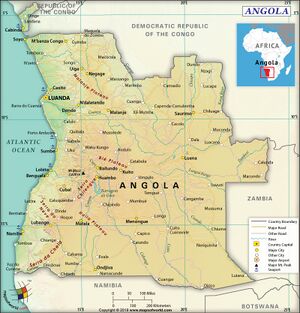People's Republic of Angola: Difference between revisions
m (1 revision imported) |
Harrystein (talk | contribs) m (WL CE) |
||
| Line 1: | Line 1: | ||
The People's Republic of Angola was a Marxist-Leninist state opposed to both Portuguese and | The '''People's Republic of Angola''' was a [[Marxist-Leninist]] state opposed to both [[Portuguese]] and [[America]]n influence. Lasting from 1975 to 1992, the state existed for the duration of the Angolan Civil War. | ||
{{Infobox country | {{Infobox country | ||
| Line 10: | Line 10: | ||
}} | }} | ||
==Politics== | ==Politics== | ||
Under a | Under a Marxist-Leninist government adherent to [[democratic centralism]], the Marxist-Leninist party, ''Movimento Popular de Libertação de Angola'' (or MPLA) was the leading and only legal party. | ||
==Natural Resources== | ==Natural Resources== | ||
Angola is a land rich in natural resources. Most notable are the country's large oil reserves. The nation's exports include: crude oil, diamonds, refined petroleum products, coffee, sisal, fish and fish products, timber, cotton | Angola is a land rich in natural resources. Most notable are the country's large oil reserves. The nation's exports include: crude oil, diamonds, refined petroleum products, coffee, sisal, fish and fish products, timber, and cotton. | ||
==Standard of Living== | ==Standard of Living== | ||
Despite being scarred by decades of colonialism and civil war, the average person residing in the People's Republic of Angola lived a relatively comfortable life. | Despite being scarred by decades of colonialism and civil war, the average person residing in the People's Republic of Angola lived a relatively comfortable life. | ||
The vast amount of natural resources possessed by Angola made trade with its allies in the | The vast amount of natural resources possessed by Angola made trade with its allies in the [[Eastern Bloc]] profitable and easy, with the profits being distributed amongst the people. | ||
Social services were steady, with the Republic of Cuba sending vital medical supplies and well trained doctors. | Social services were steady, with the [[Republic of Cuba]] sending vital medical supplies and well trained doctors. | ||
[[category:socialist states]] | |||
[[category:africa]] | |||
Revision as of 19:25, 18 April 2023
The People's Republic of Angola was a Marxist-Leninist state opposed to both Portuguese and American influence. Lasting from 1975 to 1992, the state existed for the duration of the Angolan Civil War.
| People's Republic of Angola República Popular de Angola | |
|---|---|
[[File: |300px|center|frameless]] |300px|center|frameless]]Map of People's Republic of Angola
| |
[[File: |125x63px|frameless]] |125x63px|frameless]]
|
[[File: |85x88px|frameless]] |85x88px|frameless]]
|
| Flag | State Emblem |
Politics
Under a Marxist-Leninist government adherent to democratic centralism, the Marxist-Leninist party, Movimento Popular de Libertação de Angola (or MPLA) was the leading and only legal party.
Natural Resources
Angola is a land rich in natural resources. Most notable are the country's large oil reserves. The nation's exports include: crude oil, diamonds, refined petroleum products, coffee, sisal, fish and fish products, timber, and cotton.
Standard of Living
Despite being scarred by decades of colonialism and civil war, the average person residing in the People's Republic of Angola lived a relatively comfortable life. The vast amount of natural resources possessed by Angola made trade with its allies in the Eastern Bloc profitable and easy, with the profits being distributed amongst the people. Social services were steady, with the Republic of Cuba sending vital medical supplies and well trained doctors.